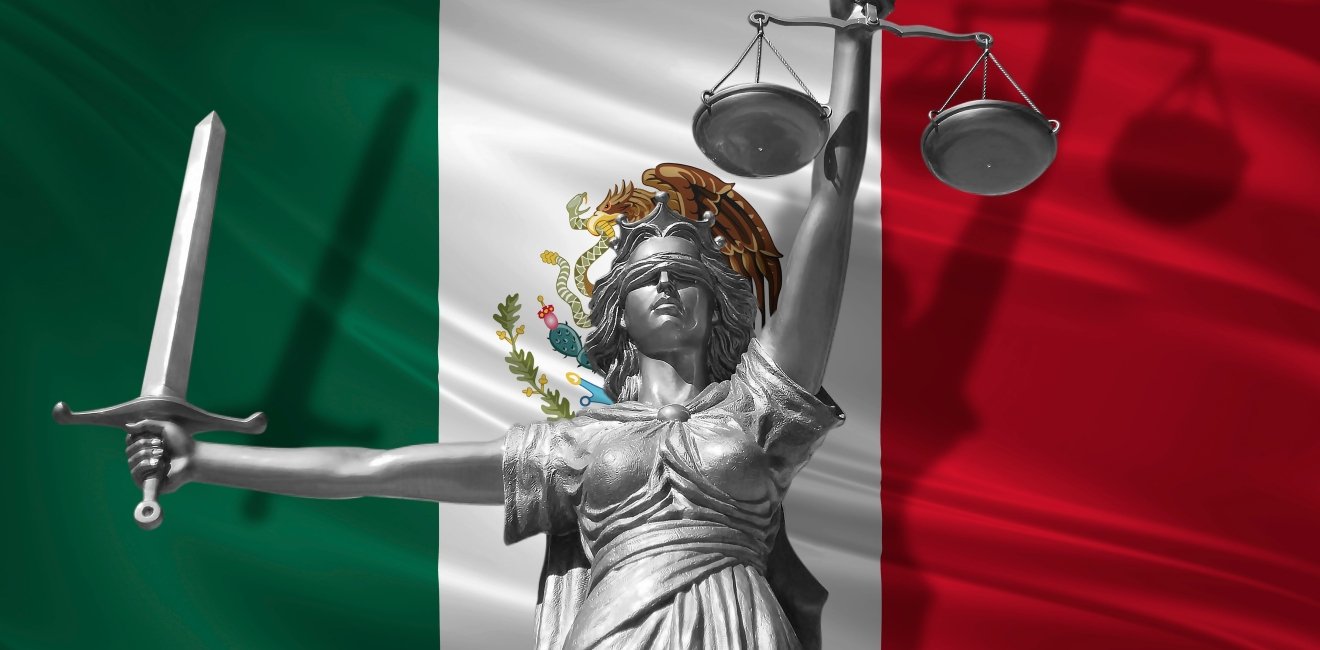
On his last day celebrating Mexican Independence Day as president, Andrés Manuel López Obrador (AMLO) triumphed in his previous and most consequential political undertaking: to disappear the judiciary as it had evolved in the last 30 years of democratic liberalization in the country.[1] Through a constitutional amendment that distorts the over-a-century-old Constitution’s political design, AMLO’s judiciary overhaul passed with super-majority votes by the Mexican House of Representatives and Senate. Less than 32 hours later, the constitutional reform passed with the required simple majority vote of 17 of the 32 local legislatures, most in control of Morena.[2]
The reform, in a nutshell
On its face, the amendment is compliant with the “hard” process for constitutional amendment outlined in Article 135 of the Mexican Constitution.[3] The tactics that AMLO and his controlled Morena resorted to get these results, however, range from threatening criminal prosecution to a Senator’s father while offering criminal immunity from pending counts of corruption and child pornography to another.[4] As it factually occurred, the amendment process should alarm all remaining liberal democracies. It also could raise a plausible legal defense against its validity.[5]
The amendment extinguished the Consejo de la Judicatura Federal (CJF). The CJF was a constitutional autonomous body supervising and policing the judiciary, independent of the other two powers that played a limited role in electing the CJF’s counselors. The crucial words being autonomous and independent. The amendment will give the executive and legislative direct oversight over the judges and their new supervisors. This significantly affected the core values of the constitutional design of the Mexican republic and offset the power balance, which allowed the Court to become the firmest check on AMLO’s presidentialist tendencies.[6]
On a structural level, the amendment dynamited the current composition of the judiciary, leaving the country in turmoil and legal insecurity. The amendment will eventually result in over seven thousand judges being removed from their positions, including all eleven members of the Supreme Court. By instilling a direct democratic electoral process for judicial appointments, AMLO’s judicial overhaul will effectively extinguish the appointment-based system that aims to foster judicial careers based on training and qualifications previously overseen by the CJF.
Already, the first steps of implementation are causing problems. The amendment eliminated the two chambers of the Supreme Court, only allowing the Court to sit en banc. It also shortened the seats by two. The steps for making such organizational changes need to be clarified. There is also no clear mandate on how all the pending cases in the disappearing Chambers’ dockets will be administered.
On a democratic level, the amendment has shifted the judiciary’s core mission, long understood to be “to defend the Constitution and protect human rights.” Under the new scheme, the judges will share the political accountability naturally ascribed to popularly elected officials. From primarily acting as guarantors of the Constitutional order, they will know they must shift their efforts to keep voters (and financial supporters) happy.
However, the amendment's potentially disastrous effects will likely result in two dreadful consequences. On one hand, Mexico will regress to a one-party presidential regime. On the other, its immediate implementation will set the grounds for unprecedented control and influence by Mexico’s darkest force: Narco and organized crime.
Back to the 20th Century
In the cumulative, AMLO’s amendments intend to restore a political order that began shifting thirty years ago but lasted through most of the 20th century. One party that rules it all and answers to one leader. A president that decides his successor.[7] A congress that responds to the President’s commands. Now, a Judiciary that is subject to direct Executive oversight. And soon, no Fourth-Branch autonomous agencies.[8] This was not the tale of most of his administration, however.
Before the last elections, AMLO lacked the overwhelming majority he had just secured. That prevented him from making any other constitutional amendments without the opposition joining. Meanwhile, the judiciary acted as an effective check to both the President and Congress in their most out-of-pocket and clearly unconstitutional enterprises. Without any remaining checks, AMLO’s vision of a one-leader country and heavy militarization seems closer than ever.
The Growing Narco Influence on the Democratic Process
Most liberal democracies today reject the counter-majoritarian critique that would have judiciary members popularly elected,[9] at least on a federal level. However, in the case of Mexico, the discussion is not only a matter of political philosophy and constitutional design. The country currently lacks the conditions to sustain the massive judiciary elections fairly and equitably. This year’s election season was Mexico’s biggest and bloodiest in modern history. Over 330 recorded violent incidents (of which 95 resulted in deaths) targeted towards political figures took place.[10] Narco, Mexico’s biggest cancer, contributed to the problem.
Mexico’s democratic infrastructure is at its weakest, and there is no technical body today fit to organize transparent elections. AMLO finally won his long war against the National Electoral Institute (INE) and the Electoral Federal Court (Tribunal Electoral). After years of constant sparring and incessant institutional weakening, the institutions that held the Mexican democracy together have been defeated and will soon be dismantled. There are also no conditions to guarantee the security of the upcoming judicial candidates. Mainly, when the role of the judiciary plays even closer to organized crime’s business, the control of who goes to jail will be up for grabs in the whole nation—the ultimate price for Narco and organized crime.
Meanwhile, organized crime and violence are at an all-time high. Just this week, a significant city in the north of the country has been in a constant state of emergency and shock due to the open conflict between two of the country’s biggest cartels. AMLO’s security strategy has been heavily criticized as his hugs, not bullets policy (or lack thereof) has resulted in shameful results. Allowing a growing unease about his relationship with Joaquín “Chapo” Guzmán began with his odd and controverted visit to Badiguarato (where Chapo is from).
On September 17, Genaro García Luna, Mexico’s former top security official and now convicted drug-trafficking felon, published an open letter accusing AMLO of coordinating with the cartels through his administration. Irrespective of any merit (or lack thereof) of his claims, the Narco tumor has kept growing. As judiciary positions become available through the implementation of AMLO’s reform and up for grabs through upcoming elections, the Narco influence is sure to be dreadfully felt. The stage is set for the most significant democratic threat that Mexico has faced in this century to explode before our faces.
[1] Peter Weber, Mexico Ratifies Contentious Judicial Overhaul, The Week (Sept. 13, 2024), https://theweek.com/politics/president-andres-manuel-lopez-obrador-mexico-judicial-overhaul.
[2] Ídem.
[3] Mexico formally has a hard constitutional amendment process as it requires super majorities in Congress and the simple majority vote of the local legislatures. However, Mexico’s constitution has been amended over seven hundred times. See Rosalind Dixon, "Constitutional Amendment Rules: A Comparative Perspective" (University of Chicago Public Law & Legal Theory Working Paper No. 347, 2011).
[4] Protesters Storm Mexico’s Senate After Ruling Party Wins Votes for Court Overhaul, Associated Press, Sept. 11, 2024, https://www.nbcnews.com/news/world/protesters-storm-mexicos-senate-ruling-party-wins-votes-court-overhaul-rcna170568.
[5] Already constitutional claims are being filed arguing serious vices in the amendment process. However, Mexico’s judiciary has never overturned or even analyzed the merits of a claim against a constitutional amendment.
[6] See Laura Rojas Zamudio, Un Sexenio de Incumplimiento de Decisiones del Poder Judicial de la Federación [Six years of Non-Compliance to the Decisions of the Federal Judiciary], El Juego de la Corte (Sept. 4, 2022), https://eljuegodelacorte.nexos.com.mx/un-sexenio-de-incumplimiento-de-decisiones-del-poder-judicial-de-la-federacion/.
[7] The Democratic Transitions in Mexico and Latin America in the Late 20th Century, Facultad de Economía “Vasco de Quiroga”, Economía y Sociedad, vol. X, no. 16, July-Dec. 2005, https://dialnet.unirioja.es/descarga/articulo/5900524.pdf
[8] The next major constitutional amendment pending will seek to extinguish most constitutionally autonomous agencies, most in charge of highly technical and transcendent areas.
[9] Even in the United States Federal Judges are never elected popularly. Their role is understood to encompass not only the administration of justice but the defense of the Constitution and check to the other powers. Therefore not suitable for a popularly vote. See Alexander M. Bickel, The Least Dangerous Branch: The Supreme Court at the Bar of Politics 16–17 (1962). S
[10] According to the Armed Conflict Location & Event Data “The election was marred by assassinations and targeted attacks on candidates and other political figures. ACLED records over 330 incidents of violence targeting political figures during the election campaign, between the start of the federal campaign on 1 March and the voting day on 2 June. At least 95 incidents led to one or more reported deaths. The level of violence during this election campaign marks a record high that eclipses the violence recorded in the 2018 general and 2021 federal elections, which had 254 and 257 events”.
Author




